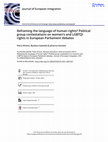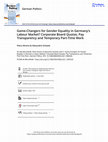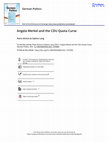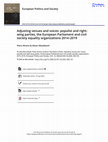Books by Petra Ahrens

Springer, 2020
This book provides a timely and unique contribution to current debates on how effectively volunta... more This book provides a timely and unique contribution to current debates on how effectively voluntary party quotas address the persistent underrepresentation of women in legislatures. Using a most similar case design and a mixed-methods approach, the authors draw attention to the ways in which electoral systems and party regulations interface with voluntary party quotas in Germany and Austria. All quota parties in these countries support the goal of equal participation of women and men in elected office, and quotas are presented as a means to precisely that end.
In order to assess parties’ commitment to their declared goals, and the effectiveness of quotas, the book introduces the concept of the post-quota gender gap and defines it as the difference between a party’s adopted quota and the actual share of women in legislative bodies at the national and regional level. Complementing the existing literature on recruitment and socio-cultural legacies, the authors argue that the problem of voluntary party quotas lies at the intersection of party quota design and electoral law. Either parties need to design quotas that actually work within a given electoral system, or we need legislative action geared toward advancing parity not just in candidate selection, but in the composition of legislatures. The book draws on gendered candidate and election data, on the party statutes of federal and state-level party organizations, and on interviews with party officials and party women’s organizations.
ECPR Press / Rowman&Littlefield, 2019
Gendering the European Parliament: Structures, Policies and Practices provides a multifaceted in... more Gendering the European Parliament: Structures, Policies and Practices provides a multifaceted innovative analysis of the EP by studying it comprehensively from a gender perspective addressing changes and continuities. It asks how and why the EP, as an institution, is gendered and what the gendered impacts of recent changes are when it comes to the structures, policies and practices of the EP. This collection brings together scholars from a variety of different disciplines (sociology, political sciences, law, management studies and cultural studies) as well as theoretical and methodological backgrounds who are united by their ability to provide the puzzle pieces necessary to fully comprehend the EP from a gender perspective.
Basingstoke: Palgrave Macmillan, 2018
Articles by Petra Ahrens

Journal of European Integration, 2021
European integration is challenged on numerous grounds today with democracy and fundamental value... more European integration is challenged on numerous grounds today with democracy and fundamental values at the center of the debates. The article analyses the role of the European Parliament's political groups in shaping human rights as a core democratic value and the ways in which religion and gender equality are utilized. The research material consists of plenary debates and 130 MEP and staff interviews in the 8th and 9th legislatures. We discern three clusters in the ways in which the political groups frame human rights and gender equality: (i) 'the defenders', (ii) 'the reframers', and those (iii) 'sitting on the fence'. Our analysis illustrates that core EU values such as human rights and equality are defended, challenged, and reframed by the political groups to an extent that they constitute key lines of division not only in between but also within the political groups.

German Politics, 2021
Whilst maintaining its status as an economic engine in Europe, Germany has historically been a la... more Whilst maintaining its status as an economic engine in Europe, Germany has historically been a laggard in adopting gender equality measures. The European Gender Equality Index, however, now ranks Germany relatively high and shows substantial progress since 2005. While this has gone mostly unnoticed, Germany has passed far-reaching legislation in major policy fields relevant for gender equality. This expansive policy adoption occurred during the chancellorship of Angela Merkel, but we still know little about the actors and processes that explain it. The divergent perceptions of Germany in relation to gender invite deeper scholarly investigation. In general, we lack knowledge about how conservative women and their parties lead on gender policy. More specifically, we need to know more about how policy measures introduced by conservative governments affect gender norms and gender culture, and if they ultimately lead to effective implementation and greater equality. Investigating the effects of Merkel’s tenure on gender equality, we assess policy output and outcomes with a focus on internal power dynamics in Germany, as well as international and EU-level pressures in the policy domains of political representation, LGBTI rights, migration, the labour market, and care.

German Politics, 2021
With a women’s employment rate of 76.6 per cent, Germany now ranks among the top EU countries reg... more With a women’s employment rate of 76.6 per cent, Germany now ranks among the top EU countries regarding equal labour market participation. However, substantial differences in the employment patterns of women and men persist in the form of ‘typical’ women’s and men’s jobs, women’s underrepresentation in higher management, a high women’s part-time rate and a considerable gender pay gap. Since 2005, four CDU-led governments have adopted various labour laws, with the most recent of these potentially transforming gendered inequalities. The 2016 corporate board quota law addressed vertical segregation, the 2017 pay transparency act is seen as a means of tackling the enormous gender pay gap and the legal entitlement to temporary part-time work, which came into force in 2019, may tackle the so-called ‘part-time trap’ many women fall victim to. The article examines the implementation impact of the latest labour market reforms and discusses the ways in which they are potential game-changers in transforming the German gendered labour market.

During the 2019 centennial celebration of women's suffrage in Germany, Chancellor Angela Merkel c... more During the 2019 centennial celebration of women's suffrage in Germany, Chancellor Angela Merkel conceded that gender quotas are important and that the ultimate goal must be gender parity. Merkel's legacy in terms of advancing women within her own party, however, is mixed. Surrounding herself with a tight circle of women professionals and arguably modelling success for fellow women party members, she nonetheless remained noncommittal on parity. Her support for the 'quorum', a 33 per cent inner-party 'quota light' adopted in 1996, appeared muted and inconsequential. Throughout Merkel's chancellorship, the CDU failed to adhere to this quota in party offices and among parliamentarians. Analysing gender-disaggregated party and electoral data with insights gleaned from semi-structured interviews with party members, this article sheds light on CDU quota implementation challenges. We assess innerparty politics and policies within the context of the CDU's struggle to attract female voters, to respond to an increasingly progressive Women's Union, and to accommodate its Bavarian sister party, the CSU. We find that despite a reframing of its gender equality agenda and strong inner-party mobilisation, the CDU majority still resists quotas. The mismatch between party statutes and electoral system, moreover, obstructs quota implementation, making gender parity in the CDU an elusive goal. INTRODUCTION Angela Merkel's final year as Chancellor of Germany might well be entering, if not the history books, then the annals of her Christian Democratic Party (CDU) as the 'year of the quota curse.' First off, in summer 2020, the Chancellor's long-time heir-apparent and leader of the CDU, Annegret Kramp-Karrenbauer, circulated a submission to the party's programmatic commission that, if passed by the party convention, would revolutionise the way the party selects candidates for elections as well as for inner-party positions. Replacing the CDU's 1996 soft quota, the so-called 33 per cent 'quorum,' 1 the party would establish a set gender quota that by 2025 would reach 50 per cent for all party offices and candidate lists (CDU 2020, 8). A few months later, in November 2020, Merkel's public support was crucial for passing a revised corporate board quota lawproposed by her Social Democratic Party (SPD) coalition partnerin order to address the massive underrepresentation of women on executive boards (Süddeutsche Zeitung, November 21, 2020; on labour market policies see Ahrens and Scheele, this issue).
GENDER, 2021
Das Europäische Parlament (EP) hat sich als eines der wenigen Parlamente weltweit seit 2003 in in... more Das Europäische Parlament (EP) hat sich als eines der wenigen Parlamente weltweit seit 2003 in insgesamt sechs Entschließungen zur Umsetzung von Gender Mainstreaming (GM) verpflichtet. Ausgehend von dem Ansatz des Feministischen Institutionalismus analysiert dieser Beitrag chronologisch die potenzielle Institutionalisierung von GM und fragt, inwieweit sich neue Regeln und Normen in bestehende formale und informelle Regeln einflechten lassen. Hierfür werden zentrale EPDokumente für den Zeitraum 2003 bis 2019 sowie leitfadengestützte Interviews mit MEPs verschiedener Fraktionen und EP-Beschäftigten aus 2019 und 2020 analysiert. Insgesamt
kann von einer GM-Institutionalisierung gesprochen werden, wenn sie auch heterogen verläuft.
Journal of Common Market Studies, 2020
In 2017, at a time when the EU was experiencing a triple crisis, the European Commission publishe... more In 2017, at a time when the EU was experiencing a triple crisis, the European Commission published a White Paper containing five scenarios outlining potential ways out of it. In his State of the Union address Commission President Juncker added a sixth. Although the Commission refers to fundamental values it neglects gender equality and reduces equality to the harmonization of the quantity of fish in fish fingers and EU-wide access to vaccination against measles. Despite the neglect of gender equality, the scenarios are not gender neutral. A feminist institutionalist analysis unpacks the potential direct and indirect positive and negative gendered consequences of each scenario and illuminates how the choice of scenario makes a difference as to their gendered impacts and as to the access for feminist actors to bring gender issues to the table.

European Politics and Society, 2020
The European Parliament (EP) offers channels for policy input through committees, intragroups, an... more The European Parliament (EP) offers channels for policy input through committees, intragroups, and the commissioning of reports and studies. Civil society equality organizations (CSOs) promoting diversity, gender equality and sexual rights are among the actors using such channels. Today they experience severe cutbacks and direct attacks by populist and radical-right parties who increasingly gained electoral support in several member states. The trajectory on the supranational level is less clear. This article examines the question of whether the increase in populist and right-wing parties in the EP changed how supranational CSOs promoting (gender) equality used venues for making their voice heard in EP policy-making in the 2014-2019 legislature. We investigate the challenges to the relationships between the EP, its committees and political groups, and equality CSOs. Analysing documents and interviews with MEPs and CSOs, our findings show that in the changing political environment, CSOs have moved towards more informal channels of participation, thereby avoiding polarization and conflict and maintaining an effective presence on the political stage.

Aus Politik und Zeitgeschichte, 2018
Demokratiegeschichte wird fast immer als Revolutionsgeschichte erzählt -und damit oft als eine Sa... more Demokratiegeschichte wird fast immer als Revolutionsgeschichte erzählt -und damit oft als eine Sache der Männer. Es lohnt sich häufig, den Blick auf Demokratiegeschichte um die Themen Reformen, transnationale Entwicklungen und Geschlecht zu erweitern. Seite 04-09 KERSTIN WOLFF AUCH UNSERE STIMME ZÄHLT! DER KAMPF DER FRAUENBEWEGUNG UM DAS WAHLRECHT IN DEUTSCHLAND Vor 100 Jahren wurde das Frauenwahlrecht in Deutschland eingeführt. Nicht Weltkrieg und Novemberrevolution waren die Auslöser für die Einführung, dieser ging vielmehr ein langer, letztlich erfolgreicher Kampf der Frauenbewegung voraus. Seite 11-19 JANA GÜNTHER DIE SUFFRAGETTEN: MIT MILITANZ ZUM FRAUENSTIMMRECHT Nach einer langen, erfolglosen Kampagne für das Frauenstimmrecht radikalisierte sich ein Teil der britischen Frauenbewegung. Die Suffragetten sorgten mit ihren militanten Aktionen für Aufsehen. 1918 wurde schließlich das (eingeschränkte) Frauenwahlrecht eingeführt. Seite 20-27 GABRIELE ABELS · PETRA AHRENS · AGNES BLOME GESCHLECHTERGERECHTE REPRÄSENTATION IN HISTORISCHER UND INTERNATIONALER PERSPEKTIVE Vor 100 Jahren erhielten Frauen in Deutschland das aktive und passive Wahlrecht und wurden damit de jure zu vollwertigen Staatsbürgerinnen. Das war das Ergebnis eines langen Kampfes. Gleichwohl ist de facto ihre politische Gleichheit bis heute nicht voll verwirklicht. Seite 28-36 GESINE FUCHS WÄHLEN FRAUEN ANDERS ALS MÄNNER? Wer wen warum wählt und welche Unterschiede es zwischen den Geschlechtern gibt, zeigt dieser Beitrag anhand des Wahlverhaltens von Frauen und Männern in Deutschland. Er wirft einen Blick auf Präferenz-Wahlsysteme und Sachabstimmungen. Seite 37-44 HODA SALAH PARTIZIPATION UND REPRÄSENTATION VON FRAUEN IN ARABISCHEN LÄNDERN In fast allen arabischen Staaten gibt es mittlerweile das Frauenwahlrecht. Von gleichberechtigter Teilhabe sind die Frauen aber oft weit entfernt. Das Spannungsfeld zwischen Religionsgesetz und (semi-)säkularem Staat bildet das Haupthindernis für die Umsetzung ihrer Rechte. Seite 45-54 03 EDITORIAL "Es giebt keine Freiheit der Männer, wenn es nicht eine Freiheit der Frauen giebt. Wenn eine Frau ihren Willen nicht zur Geltung bringen darf, warum soll es der Mann dürfen." Hedwig Dohm (1831-1919) Fast 100 Jahre nach Einführung des Frauenwahlrechts in Deutschland wird Bundeskanzlerin Angela Merkel als mächtigste Frau der Welt gehandelt, an der Spitze der ältesten deutschen Partei steht Andrea Nahles, und Ursula von der Leyen befehligt die deutschen Streitkräfte. Seit jenen Tagen, als ihnen noch mit dem Verweis auf ihre "Natur" das (aktive) Frauenstimmrecht und das passive Wahlrecht vorenthalten wurde, haben Frauen beziehungsweise die Frauenbewegung viel erreicht.

Methodological Innovations, 2018
An essential characteristic of political systems is the coexistence and interdependence of formal... more An essential characteristic of political systems is the coexistence and interdependence of formal and informal policy networks. This article describes applying qualitative network analysis as an innovative method of gathering discursive forms of data on maintaining complex transnational networks in the everyday work of individual actors. Complementary to social network analysis, qualitative network analysis allows collecting details on (a) the meaning individual actors attach to their network ties and the network as a whole, (b) data on informal policy networks not available through quantitative analysis, and (c) an insider view on the relationship between informal and formal policy networks. The article contributes to developing new methodological techniques in studying the European Union policy-making by illustrating opportunities and challenges of qualitative network analysis for studying transnational policy networks.
The European Parliament's Committee on Women's Rights and Gender Equality (FEMM Committee) is a c... more The European Parliament's Committee on Women's Rights and Gender Equality (FEMM Committee) is a core actor within the European Union's gender equality policy machinery. Its capacity to act, though, is shaped by the institutional setting within the European Parliament (EP). Using a qualitative approach, this article shows how this particular committee exploits parliamentary rules and routines to maximise its influence. Existing scholarship has suggested that the voluntary nature of its membership implies a weak position within the EP. However, there is evidence to support a contrary interpretation that its voluntary membership assures institutional persistence, thematic inclusion, organisational attention and networked integration.
doi: 10.1093/pa/gsw005
Notes 1 In parliament, SYRIZA managed to secure the largest percentage of women amongst all polit... more Notes 1 In parliament, SYRIZA managed to secure the largest percentage of women amongst all political parties. In 2015, 45 out of 149 MPs are women (30,2%); the second largest party, right-wing New Democracy, has ten women out of 76 MPs (13,2%), Golden Dawn two women out of 17 MPs (11,8%), the River four women out of 17 MPs (23,5%), the communist party KKE four women out of 15 MPs (26,7%), the ANEL party three women out of 13 MPs (23,1%) and PASOK two women out of 13 MPs (15,4%).

FEMINA POLITICAZeitschrift für feministische …, Jan 1, 2012
Die Frage nach Handlungsmacht beschäftigt SubjekttheoretikerInnen, Institu tio nenforscherInnen u... more Die Frage nach Handlungsmacht beschäftigt SubjekttheoretikerInnen, Institu tio nenforscherInnen und politische PraktikerInnen. Sie ist für feministische Po li tik(wissenschaft) zentral, berührt sie doch die Möglichkeiten der Veränderung von Subjekten und Strukturen oder auch allgemeiner: von gesellschaftlichen Machtver hältnissen. Dabei ist diese Frage immer wieder neu zu stellen. Einerseits wandeln sich die gesellschaftlichen und institutionellen Bedingungen, andererseits machen neue oder neu wahrgenommene Forschungs und Reflexionsperspektiven wie bei spielsweise die postkoloniale Theorie eine Revision bisheriger Wissensbestände nö tig. Was haben der Gleichstellungsausschuss im Europäischen Parlament, die feminis tische MultikulturalismusDebatte, Judith Butler und Pierre Bourdieu gemein? Sie teilen sich das Nachdenken über Handlungsmacht. Petra Ahrens, Sara Paloni und Jule Jakob Govrin nehmen sich in den drei Beiträgen des Forums diese drei Felder vor. Auf dem geschlechterpolitischen Prüfstand stehen die institutionellen Rahmenbe dingungen im europäischen Parlament, feministische Debatten zur Handlungs(ohn) macht von Migrantinnen in westlichen Gesellschaften sowie die Theoretisierung körperpolitischer Handlungspotenziale zwischen Reproduktion und Transforma tion. Die drei Autorinnen zeigen damit, entlang welcher Spannungslinien aktuelle Debatten verlaufen und geben ihrerseits Impulse zum Weiter und Umdenken. Wenn sich Nachteile als Vorteile erweisen: Der Ausschuss für die Rechte der Frau und die Gleichstellung der Geschlechter im Europäischen Parlament 1 PETRA AHRENS Der Ausschuss für die Rechte der Frau und die Gleichstellung der Geschlechter (FEMM) im Europäischen Parlament ist ohne Frage ein zentraler Akteur europä ischer Gleichstellungspolitik. Allerdings wird nur selten danach gefragt, inwie
The paper by Petra Ahrens and Sandra Lewalter describes the adoption process of the European Inst... more The paper by Petra Ahrens and Sandra Lewalter describes the adoption process of the European Institute for Gender Equality.
Book chapters by Petra Ahrens

Mieke Verloo (ed.): Varieties of Opposition to Gender Equality in Europe Theory, Evidence and Practice. , 2018
Gender+ equality claims and feminist goals have almost always faced “backlash movements”. Direc... more Gender+ equality claims and feminist goals have almost always faced “backlash movements”. Direct opposition to gender+ equality has become unacceptable on a supranational level, because gender+ equality is a norm-loaded policy field in the EU system. Nevertheless, there exist various forms of opposition that hinder gender+ equality and the effective implementation of the current European Union (EU) policy strategy, gender mainstreaming.
This chapter discusses the role of opposition in EU gender+ equality policymaking in general, and that of indirect opposition in particular. Focusing on the individual level, it studies the narratives provided by gender+ equality actors to understand what they perceive as opposition and what its effects are on their implementation of gender mainstreaming. The chapter shows that gender+ equality policy actors face three types of indirect opposition that overlap to some extent: inertia, evasion, and degradation. These three types come in forms that are specific to gender+ equality policy and all are effective in hampering further improvements to gender+ equality. The findings suggest that opposition to gender+ equality occurs because of its central aim of changing gender norms and institutions, norms in which individuals were socialised for a lifetime and which they tend to wish to preserve.

Uploads
Books by Petra Ahrens
In order to assess parties’ commitment to their declared goals, and the effectiveness of quotas, the book introduces the concept of the post-quota gender gap and defines it as the difference between a party’s adopted quota and the actual share of women in legislative bodies at the national and regional level. Complementing the existing literature on recruitment and socio-cultural legacies, the authors argue that the problem of voluntary party quotas lies at the intersection of party quota design and electoral law. Either parties need to design quotas that actually work within a given electoral system, or we need legislative action geared toward advancing parity not just in candidate selection, but in the composition of legislatures. The book draws on gendered candidate and election data, on the party statutes of federal and state-level party organizations, and on interviews with party officials and party women’s organizations.
Articles by Petra Ahrens
kann von einer GM-Institutionalisierung gesprochen werden, wenn sie auch heterogen verläuft.
doi: 10.1093/pa/gsw005
Book chapters by Petra Ahrens
This chapter discusses the role of opposition in EU gender+ equality policymaking in general, and that of indirect opposition in particular. Focusing on the individual level, it studies the narratives provided by gender+ equality actors to understand what they perceive as opposition and what its effects are on their implementation of gender mainstreaming. The chapter shows that gender+ equality policy actors face three types of indirect opposition that overlap to some extent: inertia, evasion, and degradation. These three types come in forms that are specific to gender+ equality policy and all are effective in hampering further improvements to gender+ equality. The findings suggest that opposition to gender+ equality occurs because of its central aim of changing gender norms and institutions, norms in which individuals were socialised for a lifetime and which they tend to wish to preserve.
In order to assess parties’ commitment to their declared goals, and the effectiveness of quotas, the book introduces the concept of the post-quota gender gap and defines it as the difference between a party’s adopted quota and the actual share of women in legislative bodies at the national and regional level. Complementing the existing literature on recruitment and socio-cultural legacies, the authors argue that the problem of voluntary party quotas lies at the intersection of party quota design and electoral law. Either parties need to design quotas that actually work within a given electoral system, or we need legislative action geared toward advancing parity not just in candidate selection, but in the composition of legislatures. The book draws on gendered candidate and election data, on the party statutes of federal and state-level party organizations, and on interviews with party officials and party women’s organizations.
kann von einer GM-Institutionalisierung gesprochen werden, wenn sie auch heterogen verläuft.
doi: 10.1093/pa/gsw005
This chapter discusses the role of opposition in EU gender+ equality policymaking in general, and that of indirect opposition in particular. Focusing on the individual level, it studies the narratives provided by gender+ equality actors to understand what they perceive as opposition and what its effects are on their implementation of gender mainstreaming. The chapter shows that gender+ equality policy actors face three types of indirect opposition that overlap to some extent: inertia, evasion, and degradation. These three types come in forms that are specific to gender+ equality policy and all are effective in hampering further improvements to gender+ equality. The findings suggest that opposition to gender+ equality occurs because of its central aim of changing gender norms and institutions, norms in which individuals were socialised for a lifetime and which they tend to wish to preserve.